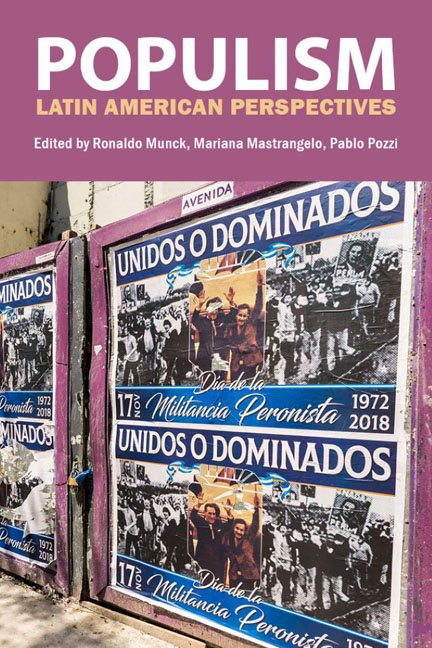Book contents
- Frontmatter
- Contents
- Abbreviations and acronyms
- Foreword
- Introduction
- 1 Populism in Latin America: development, democracy and social transformation
- 2 Peronism in Argentina: left or right?
- 3 The populist left in Chile: socialists and communists from 1936 to 1973
- 4 The left and the Workers’ Party in Brazil: a party between populism, social policies and the popular vote
- 5 Brazil, Bolsonaro and populism of the right
- 6 Political dilemmas of the government of López Obrador: between populism, democracy and the left in Mexico
- 7 The Bolivarian process in Venezuela: socialism, populism or neoliberalism?
- 8 Populist responses to crises of market democracy: the case of Bolivia’s Evo Morales
- 9 Ecuador: populism and the 2007– 17 political cycle
- 10 The Nicaraguan crisis and the mirage of left populism
- 11 Populism and the right in Latin America
- 12 Populism and the left in Latin America
- Afterword: a tale of two “people”: national popular and twenty-first-century Latin American populisms
- Contributors
- Index
Afterword: a tale of two “people”: national popular and twenty-first-century Latin American populisms
Published online by Cambridge University Press: 23 January 2024
- Frontmatter
- Contents
- Abbreviations and acronyms
- Foreword
- Introduction
- 1 Populism in Latin America: development, democracy and social transformation
- 2 Peronism in Argentina: left or right?
- 3 The populist left in Chile: socialists and communists from 1936 to 1973
- 4 The left and the Workers’ Party in Brazil: a party between populism, social policies and the popular vote
- 5 Brazil, Bolsonaro and populism of the right
- 6 Political dilemmas of the government of López Obrador: between populism, democracy and the left in Mexico
- 7 The Bolivarian process in Venezuela: socialism, populism or neoliberalism?
- 8 Populist responses to crises of market democracy: the case of Bolivia’s Evo Morales
- 9 Ecuador: populism and the 2007– 17 political cycle
- 10 The Nicaraguan crisis and the mirage of left populism
- 11 Populism and the right in Latin America
- 12 Populism and the left in Latin America
- Afterword: a tale of two “people”: national popular and twenty-first-century Latin American populisms
- Contributors
- Index
Summary
As the purpose of this book is the study of populism in Latin America, it would be understandable to skip the debate about the conceptualization of the term. Yet, without conceptualization, debates are hollow. If we do not define populism, how can we agree whether Salvador Allende or Luiz Inácio Lula da Silva can be characterized as populists? And, how can we understand the relations between populism and other essentially contested concepts (Collier et al. 2006) such as democracy? Contributors to this book define populism in a variety of ways, which results in different answers to the many questions raised by the study of populism in the region. In this overview, I will first briefly outline my understanding of populism, a conceptualization that is grounded on Ernesto Laclau's influential writings on the topic, and which is also broadly in line with the one adopted by Ronaldo Munck in the introduction to this book.
Laclau's (1979, 2005a, 2005b) theory of populism centres on the priority that populism attributes to the constitution of “the people” as a political actor within an antagonistic relation, that pits the people against a certain Other (typically, the oligarchy, the political or economic elite, the establishment, etc.). According to this criterion, the sociopolitical field is structured as a dichotomous, antagonistic relation between two sociopolitical blocs: Us (the people, the underdogs, the oppressed) and Them (the oligarchy, neoliberalism, the partocracy, etc.). The criterion also implies that populist actors take sides, by claiming to represent the underdogs or, as Igor Goicovic (Chapter 3) puts it, “the social bloc of the oppressed”.
The people, as a political actor, are the outcome of political identification, and not a pre-existing social category. As a signifier, “the people” is always something retroactively constituted, an empty signifier that needs to be invoked, a performative call that creates what it is supposed to be expressing. In this approach, the signifier, “the people” operates as a nodal point, around which different, and often antithetical, signifiers are articulated to assert who are the people and who represents them.
- Type
- Chapter
- Information
- PopulismLatin American Perspectives, pp. 221 - 240Publisher: Agenda PublishingPrint publication year: 2023

